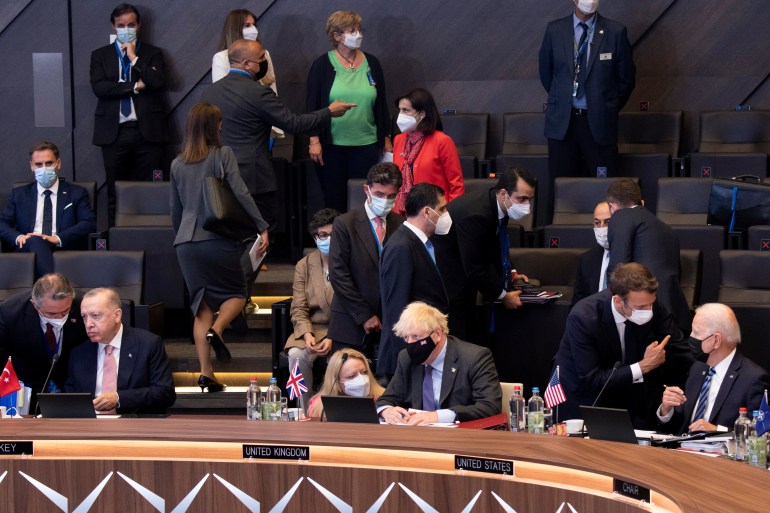NATO says China presents ‘systemic’ challenges
Beijing’s ‘assertive behaviour’ is challenging the ‘rules-based international order’, transatlantic security alliance says.

NATO has moved to confront China’s military ambitions for the first time, issuing a communique that said Beijing presents “systemic challenges” for the transatlantic security alliance.
The communique followed a summit of NATO leaders in Brussels on Monday and marked a diplomatic victory for US President Joe Biden, who had urged the 30-member strong alliance to stand up to China’s burgeoning military, political and economic might.
Keep reading
list of 4 itemsUS and NATO: Manufacturing a new cold war?
Blinken raises US concerns with China about Xinjiang, Hong Kong
‘A dystopian hellscape on a staggering scale’
The language will now set the path for alliance policy and comes a day after the Group of Seven wealthy nations issued a statement on alleged human rights abuses in China and Taiwan that Beijing said slandered its reputation.
“China’s stated ambitions and assertive behaviour present systemic challenges to the rules-based international order and to areas relevant to alliance security,” NATO’s 79-point communique said.
It accused Beijing of “rapidly expanding its nuclear arsenal” and being “opaque in implementing its military modernisation”, as well as highlighting China’s military cooperation with Russia in exercises in the Euro-Atlantic region as a concern.

“We call on China to uphold its international commitments and to act responsibly in the international system, including in the space, cyber, and maritime domains, in keeping with its role as a major power,” the communique said.
Addressing reporters following the summit, NATO Secretary General Jens Stoltenberg said there was a “strong convergence of views among allies” regarding the challenges posed by Beijing’s behaviour.
“Leaders agreed that we need to address such challenges as an alliance and that we need to engage with China to defend our security interests,” he said.
Biden said the alliance’s mutual defence pact was a “sacred obligation” for the US – a marked shift in tone from his predecessor Donald Trump, who had threatened to withdraw from the alliance and accused Europeans of contributing too little to their own defence.
“I want all Europe to know that the United States is there,” said Biden. “NATO is critically important to us.”
Balancing threat
Germany’s Chancellor Angela Merkel, at her last summit of the alliance before she steps down in September, described Biden’s arrival as the opening of a new chapter. She also said it was important to deal with China as a potential threat, while keeping it in perspective.
“If you look at the cyber threats and the hybrid threats, if you look at the cooperation between Russia and China, you cannot simply ignore China,” Merkel told reporters. “But one must not overrate it, either – we need to find the right balance.”
Biden said both Russia and China were not acting “in a way that is consistent with what we had hoped”.
Al Jazeera’s Senior Political Analyst Marwan Bishara said the comments made by Stoltenberg and others in Brussels should not be taken “lightly”.
“There is a new Cold War being manufactured. And this new Cold War would have a huge, huge ramifications for international security,” Bishara told Al Jazeera from Paris, France.
“What we have been seeing the last few days and today … is the US insisting on maintaining American primacy around the world, and rejecting any of sort bipolarity with China.”
In other developments, NATO’s communique said the alliance would adapt to climate-related security challenges, called on Russia to drop its designation of two allies – the United States and the Czech Republic – as “unfriendly countries” and urged Iran to stop all ballistic missile activities.
The alliance also said it was committed to providing transitional funding for the Hamid Karzai airport in Kabul, Afghanistan, after the US-led withdrawal of allied troops from the country.